Entrepreneurship and Small Business Analysis: A Report
VerifiedAdded on 2021/02/20
|19
|2801
|27
Report
AI Summary
This report delves into the multifaceted world of entrepreneurship, exploring various venture types, including social enterprises, managed growth firms, and small business entrepreneurship. It examines the similarities and differences between these ventures, highlighting their impact on the UK economy, particularly the role of micro and small businesses. The report emphasizes the importance of small and start-up businesses in fostering social economy growth through job creation, innovation, and local improvement. It also touches upon the skills, traits, and characteristics of successful entrepreneurs and how background and experience can influence entrepreneurial endeavors. The analysis underscores the significant contribution of small businesses to employment and economic development, emphasizing their role in driving innovation and community growth within the UK.

Entrepreneurship and Small
Business Management
Business Management
Paraphrase This Document
Need a fresh take? Get an instant paraphrase of this document with our AI Paraphraser
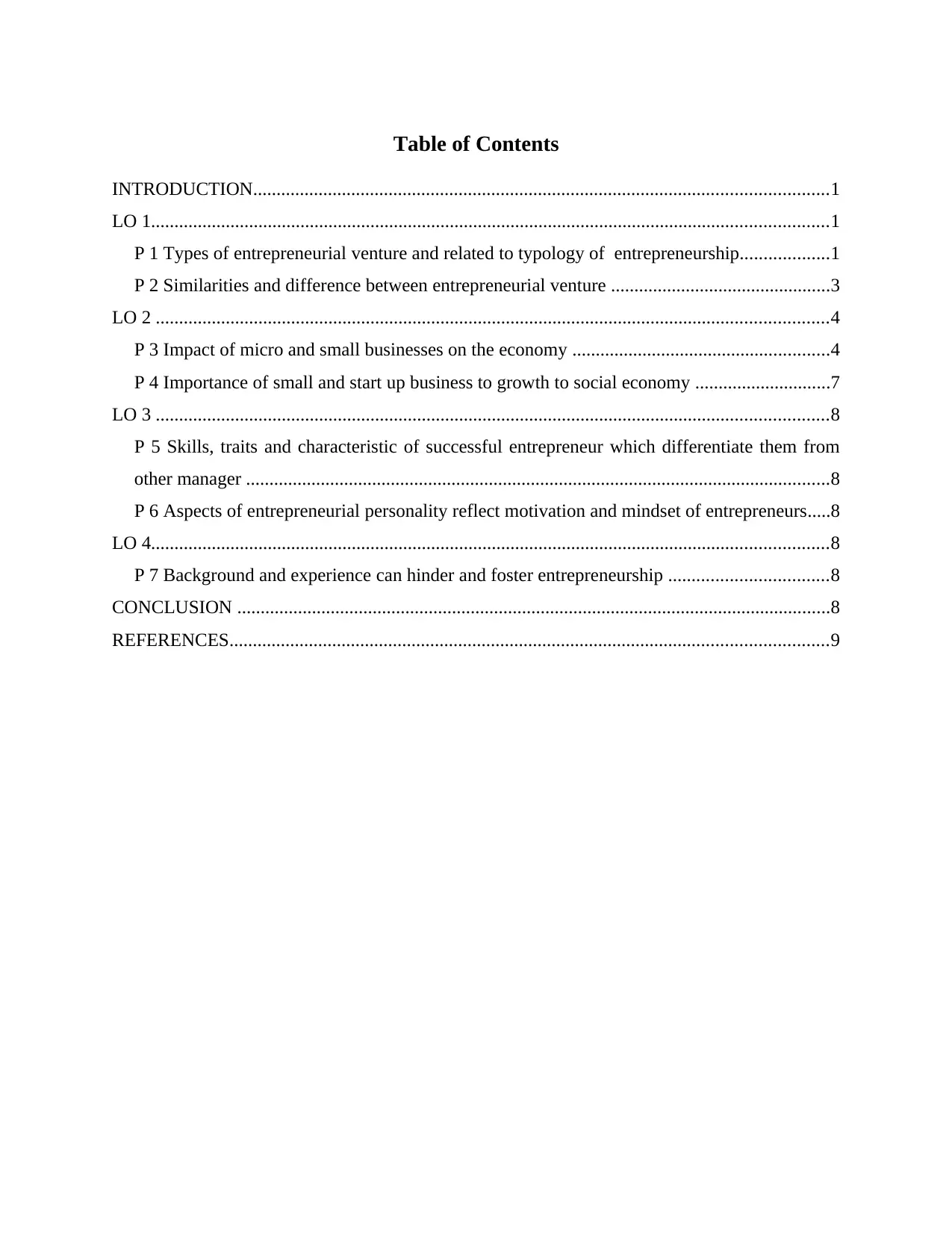
Table of Contents
INTRODUCTION...........................................................................................................................1
LO 1.................................................................................................................................................1
P 1 Types of entrepreneurial venture and related to typology of entrepreneurship...................1
P 2 Similarities and difference between entrepreneurial venture ...............................................3
LO 2 ................................................................................................................................................4
P 3 Impact of micro and small businesses on the economy .......................................................4
P 4 Importance of small and start up business to growth to social economy .............................7
LO 3 ................................................................................................................................................8
P 5 Skills, traits and characteristic of successful entrepreneur which differentiate them from
other manager .............................................................................................................................8
P 6 Aspects of entrepreneurial personality reflect motivation and mindset of entrepreneurs.....8
LO 4.................................................................................................................................................8
P 7 Background and experience can hinder and foster entrepreneurship ..................................8
CONCLUSION ...............................................................................................................................8
REFERENCES................................................................................................................................9
INTRODUCTION...........................................................................................................................1
LO 1.................................................................................................................................................1
P 1 Types of entrepreneurial venture and related to typology of entrepreneurship...................1
P 2 Similarities and difference between entrepreneurial venture ...............................................3
LO 2 ................................................................................................................................................4
P 3 Impact of micro and small businesses on the economy .......................................................4
P 4 Importance of small and start up business to growth to social economy .............................7
LO 3 ................................................................................................................................................8
P 5 Skills, traits and characteristic of successful entrepreneur which differentiate them from
other manager .............................................................................................................................8
P 6 Aspects of entrepreneurial personality reflect motivation and mindset of entrepreneurs.....8
LO 4.................................................................................................................................................8
P 7 Background and experience can hinder and foster entrepreneurship ..................................8
CONCLUSION ...............................................................................................................................8
REFERENCES................................................................................................................................9

⊘ This is a preview!⊘
Do you want full access?
Subscribe today to unlock all pages.

Trusted by 1+ million students worldwide
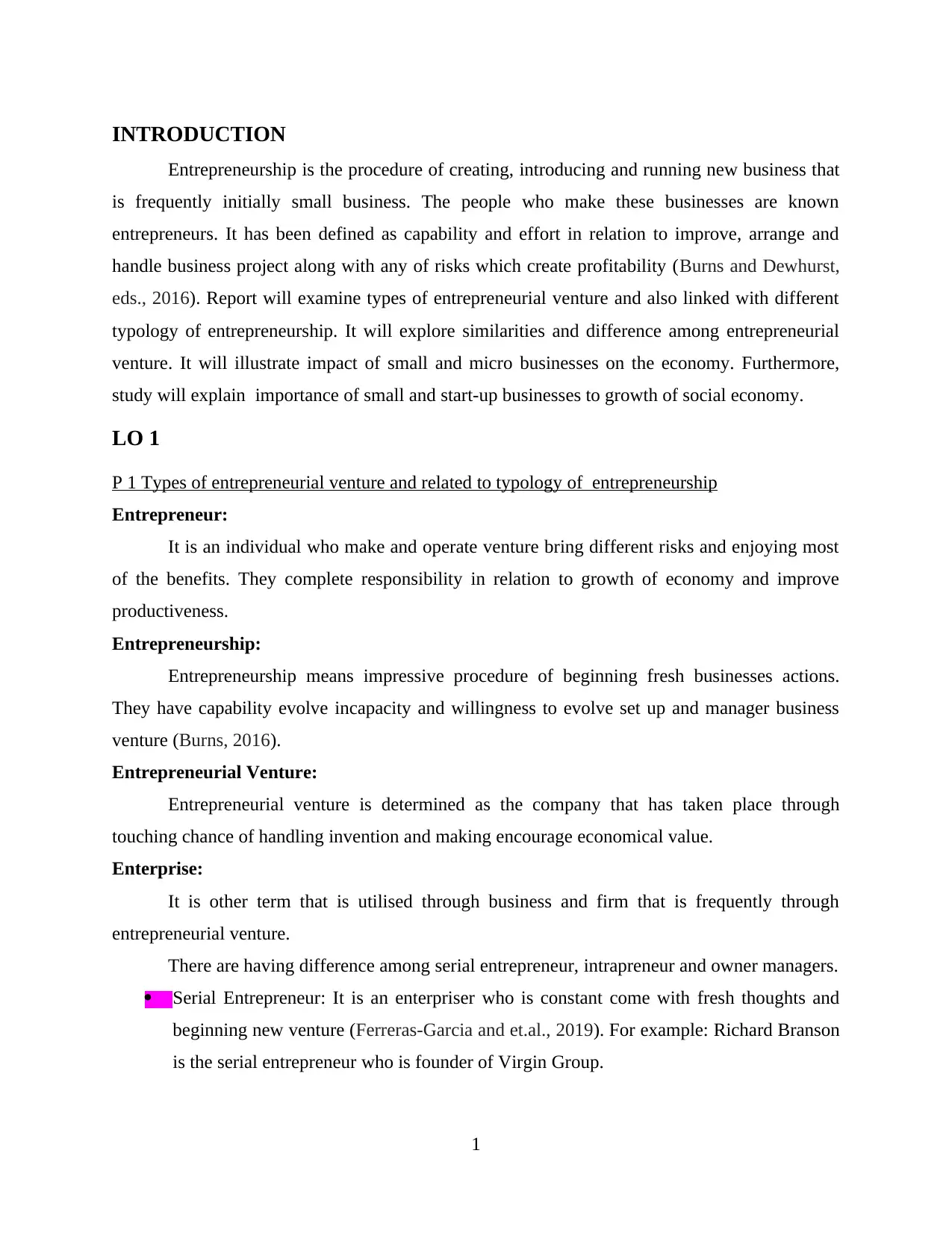
INTRODUCTION
Entrepreneurship is the procedure of creating, introducing and running new business that
is frequently initially small business. The people who make these businesses are known
entrepreneurs. It has been defined as capability and effort in relation to improve, arrange and
handle business project along with any of risks which create profitability (Burns and Dewhurst,
eds., 2016). Report will examine types of entrepreneurial venture and also linked with different
typology of entrepreneurship. It will explore similarities and difference among entrepreneurial
venture. It will illustrate impact of small and micro businesses on the economy. Furthermore,
study will explain importance of small and start-up businesses to growth of social economy.
LO 1
P 1 Types of entrepreneurial venture and related to typology of entrepreneurship
Entrepreneur:
It is an individual who make and operate venture bring different risks and enjoying most
of the benefits. They complete responsibility in relation to growth of economy and improve
productiveness.
Entrepreneurship:
Entrepreneurship means impressive procedure of beginning fresh businesses actions.
They have capability evolve incapacity and willingness to evolve set up and manager business
venture (Burns, 2016).
Entrepreneurial Venture:
Entrepreneurial venture is determined as the company that has taken place through
touching chance of handling invention and making encourage economical value.
Enterprise:
It is other term that is utilised through business and firm that is frequently through
entrepreneurial venture.
There are having difference among serial entrepreneur, intrapreneur and owner managers.
Serial Entrepreneur: It is an enterpriser who is constant come with fresh thoughts and
beginning new venture (Ferreras-Garcia and et.al., 2019). For example: Richard Branson
is the serial entrepreneur who is founder of Virgin Group.
1
Entrepreneurship is the procedure of creating, introducing and running new business that
is frequently initially small business. The people who make these businesses are known
entrepreneurs. It has been defined as capability and effort in relation to improve, arrange and
handle business project along with any of risks which create profitability (Burns and Dewhurst,
eds., 2016). Report will examine types of entrepreneurial venture and also linked with different
typology of entrepreneurship. It will explore similarities and difference among entrepreneurial
venture. It will illustrate impact of small and micro businesses on the economy. Furthermore,
study will explain importance of small and start-up businesses to growth of social economy.
LO 1
P 1 Types of entrepreneurial venture and related to typology of entrepreneurship
Entrepreneur:
It is an individual who make and operate venture bring different risks and enjoying most
of the benefits. They complete responsibility in relation to growth of economy and improve
productiveness.
Entrepreneurship:
Entrepreneurship means impressive procedure of beginning fresh businesses actions.
They have capability evolve incapacity and willingness to evolve set up and manager business
venture (Burns, 2016).
Entrepreneurial Venture:
Entrepreneurial venture is determined as the company that has taken place through
touching chance of handling invention and making encourage economical value.
Enterprise:
It is other term that is utilised through business and firm that is frequently through
entrepreneurial venture.
There are having difference among serial entrepreneur, intrapreneur and owner managers.
Serial Entrepreneur: It is an enterpriser who is constant come with fresh thoughts and
beginning new venture (Ferreras-Garcia and et.al., 2019). For example: Richard Branson
is the serial entrepreneur who is founder of Virgin Group.
1
Paraphrase This Document
Need a fresh take? Get an instant paraphrase of this document with our AI Paraphraser
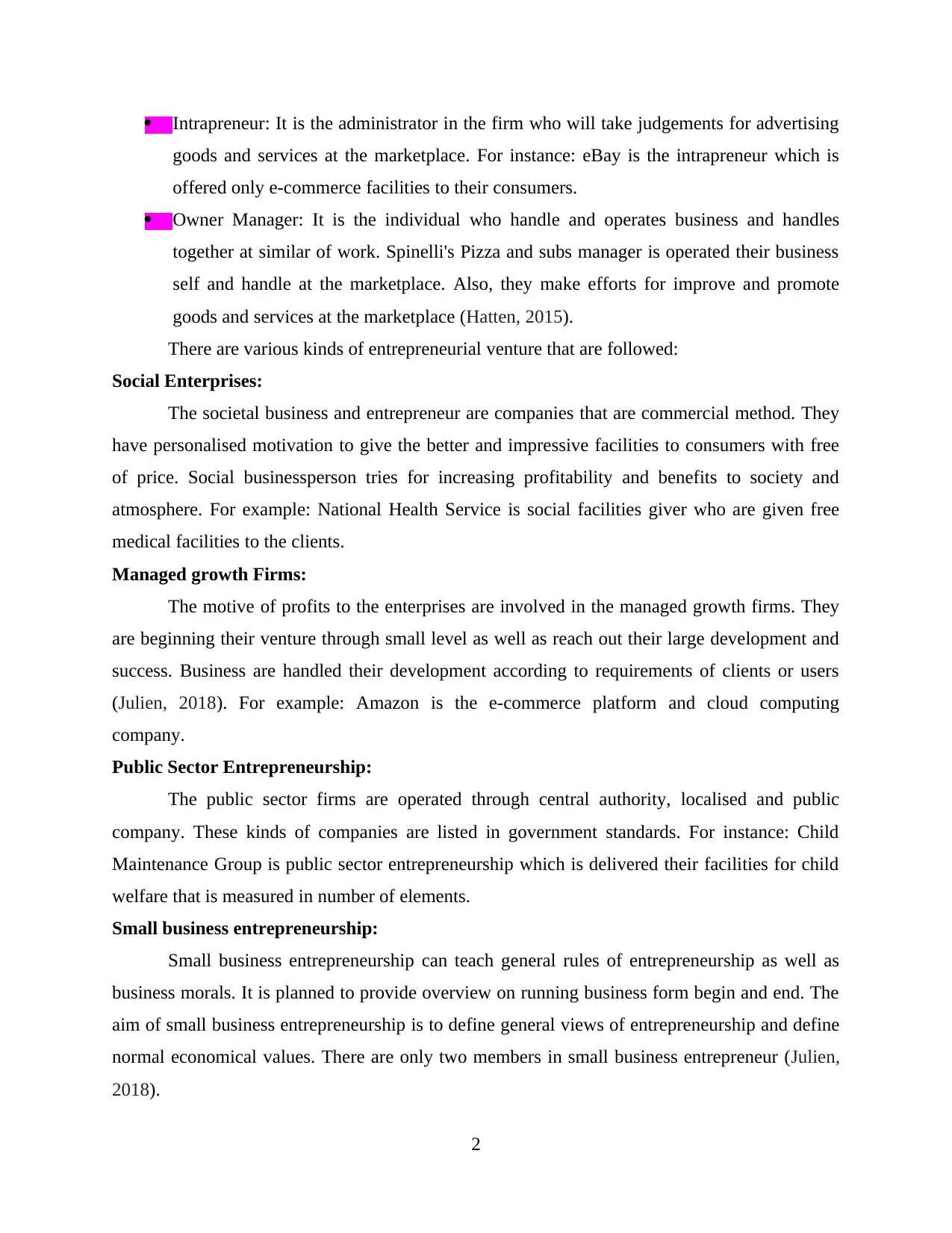
Intrapreneur: It is the administrator in the firm who will take judgements for advertising
goods and services at the marketplace. For instance: eBay is the intrapreneur which is
offered only e-commerce facilities to their consumers.
Owner Manager: It is the individual who handle and operates business and handles
together at similar of work. Spinelli's Pizza and subs manager is operated their business
self and handle at the marketplace. Also, they make efforts for improve and promote
goods and services at the marketplace (Hatten, 2015).
There are various kinds of entrepreneurial venture that are followed:
Social Enterprises:
The societal business and entrepreneur are companies that are commercial method. They
have personalised motivation to give the better and impressive facilities to consumers with free
of price. Social businessperson tries for increasing profitability and benefits to society and
atmosphere. For example: National Health Service is social facilities giver who are given free
medical facilities to the clients.
Managed growth Firms:
The motive of profits to the enterprises are involved in the managed growth firms. They
are beginning their venture through small level as well as reach out their large development and
success. Business are handled their development according to requirements of clients or users
(Julien, 2018). For example: Amazon is the e-commerce platform and cloud computing
company.
Public Sector Entrepreneurship:
The public sector firms are operated through central authority, localised and public
company. These kinds of companies are listed in government standards. For instance: Child
Maintenance Group is public sector entrepreneurship which is delivered their facilities for child
welfare that is measured in number of elements.
Small business entrepreneurship:
Small business entrepreneurship can teach general rules of entrepreneurship as well as
business morals. It is planned to provide overview on running business form begin and end. The
aim of small business entrepreneurship is to define general views of entrepreneurship and define
normal economical values. There are only two members in small business entrepreneur (Julien,
2018).
2
goods and services at the marketplace. For instance: eBay is the intrapreneur which is
offered only e-commerce facilities to their consumers.
Owner Manager: It is the individual who handle and operates business and handles
together at similar of work. Spinelli's Pizza and subs manager is operated their business
self and handle at the marketplace. Also, they make efforts for improve and promote
goods and services at the marketplace (Hatten, 2015).
There are various kinds of entrepreneurial venture that are followed:
Social Enterprises:
The societal business and entrepreneur are companies that are commercial method. They
have personalised motivation to give the better and impressive facilities to consumers with free
of price. Social businessperson tries for increasing profitability and benefits to society and
atmosphere. For example: National Health Service is social facilities giver who are given free
medical facilities to the clients.
Managed growth Firms:
The motive of profits to the enterprises are involved in the managed growth firms. They
are beginning their venture through small level as well as reach out their large development and
success. Business are handled their development according to requirements of clients or users
(Julien, 2018). For example: Amazon is the e-commerce platform and cloud computing
company.
Public Sector Entrepreneurship:
The public sector firms are operated through central authority, localised and public
company. These kinds of companies are listed in government standards. For instance: Child
Maintenance Group is public sector entrepreneurship which is delivered their facilities for child
welfare that is measured in number of elements.
Small business entrepreneurship:
Small business entrepreneurship can teach general rules of entrepreneurship as well as
business morals. It is planned to provide overview on running business form begin and end. The
aim of small business entrepreneurship is to define general views of entrepreneurship and define
normal economical values. There are only two members in small business entrepreneur (Julien,
2018).
2
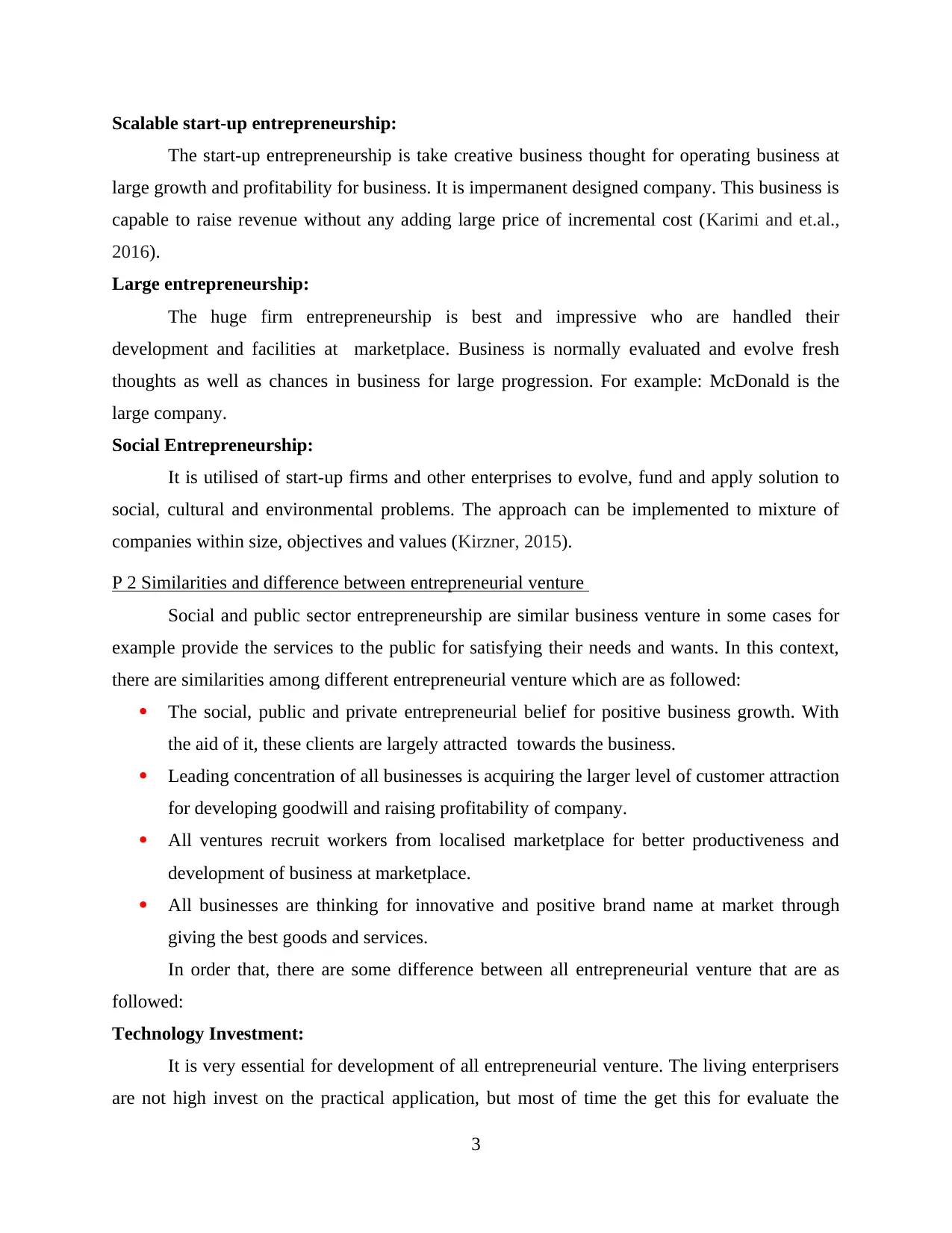
Scalable start-up entrepreneurship:
The start-up entrepreneurship is take creative business thought for operating business at
large growth and profitability for business. It is impermanent designed company. This business is
capable to raise revenue without any adding large price of incremental cost (Karimi and et.al.,
2016).
Large entrepreneurship:
The huge firm entrepreneurship is best and impressive who are handled their
development and facilities at marketplace. Business is normally evaluated and evolve fresh
thoughts as well as chances in business for large progression. For example: McDonald is the
large company.
Social Entrepreneurship:
It is utilised of start-up firms and other enterprises to evolve, fund and apply solution to
social, cultural and environmental problems. The approach can be implemented to mixture of
companies within size, objectives and values (Kirzner, 2015).
P 2 Similarities and difference between entrepreneurial venture
Social and public sector entrepreneurship are similar business venture in some cases for
example provide the services to the public for satisfying their needs and wants. In this context,
there are similarities among different entrepreneurial venture which are as followed:
The social, public and private entrepreneurial belief for positive business growth. With
the aid of it, these clients are largely attracted towards the business.
Leading concentration of all businesses is acquiring the larger level of customer attraction
for developing goodwill and raising profitability of company.
All ventures recruit workers from localised marketplace for better productiveness and
development of business at marketplace.
All businesses are thinking for innovative and positive brand name at market through
giving the best goods and services.
In order that, there are some difference between all entrepreneurial venture that are as
followed:
Technology Investment:
It is very essential for development of all entrepreneurial venture. The living enterprisers
are not high invest on the practical application, but most of time the get this for evaluate the
3
The start-up entrepreneurship is take creative business thought for operating business at
large growth and profitability for business. It is impermanent designed company. This business is
capable to raise revenue without any adding large price of incremental cost (Karimi and et.al.,
2016).
Large entrepreneurship:
The huge firm entrepreneurship is best and impressive who are handled their
development and facilities at marketplace. Business is normally evaluated and evolve fresh
thoughts as well as chances in business for large progression. For example: McDonald is the
large company.
Social Entrepreneurship:
It is utilised of start-up firms and other enterprises to evolve, fund and apply solution to
social, cultural and environmental problems. The approach can be implemented to mixture of
companies within size, objectives and values (Kirzner, 2015).
P 2 Similarities and difference between entrepreneurial venture
Social and public sector entrepreneurship are similar business venture in some cases for
example provide the services to the public for satisfying their needs and wants. In this context,
there are similarities among different entrepreneurial venture which are as followed:
The social, public and private entrepreneurial belief for positive business growth. With
the aid of it, these clients are largely attracted towards the business.
Leading concentration of all businesses is acquiring the larger level of customer attraction
for developing goodwill and raising profitability of company.
All ventures recruit workers from localised marketplace for better productiveness and
development of business at marketplace.
All businesses are thinking for innovative and positive brand name at market through
giving the best goods and services.
In order that, there are some difference between all entrepreneurial venture that are as
followed:
Technology Investment:
It is very essential for development of all entrepreneurial venture. The living enterprisers
are not high invest on the practical application, but most of time the get this for evaluate the
3
⊘ This is a preview!⊘
Do you want full access?
Subscribe today to unlock all pages.

Trusted by 1+ million students worldwide
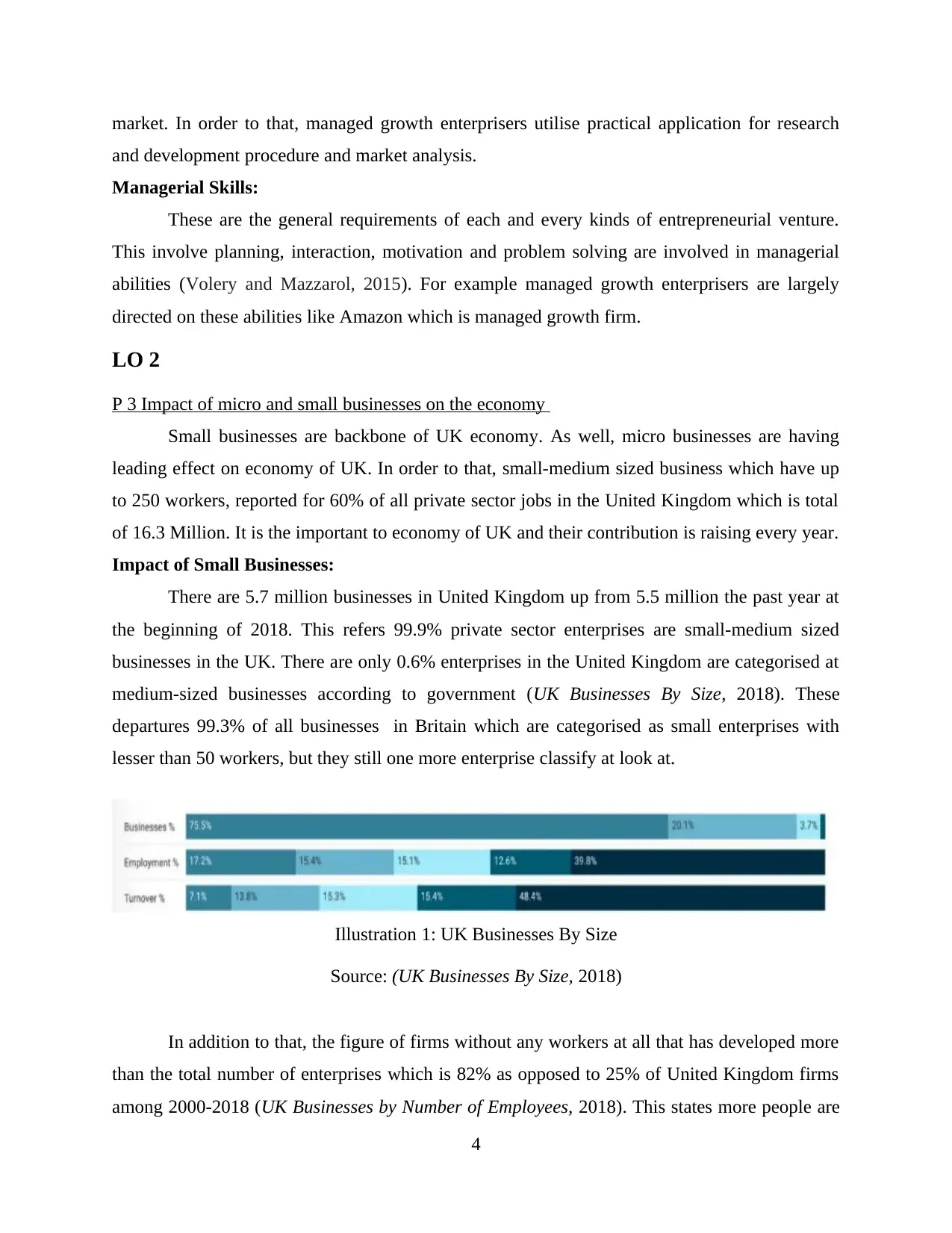
market. In order to that, managed growth enterprisers utilise practical application for research
and development procedure and market analysis.
Managerial Skills:
These are the general requirements of each and every kinds of entrepreneurial venture.
This involve planning, interaction, motivation and problem solving are involved in managerial
abilities (Volery and Mazzarol, 2015). For example managed growth enterprisers are largely
directed on these abilities like Amazon which is managed growth firm.
LO 2
P 3 Impact of micro and small businesses on the economy
Small businesses are backbone of UK economy. As well, micro businesses are having
leading effect on economy of UK. In order to that, small-medium sized business which have up
to 250 workers, reported for 60% of all private sector jobs in the United Kingdom which is total
of 16.3 Million. It is the important to economy of UK and their contribution is raising every year.
Impact of Small Businesses:
There are 5.7 million businesses in United Kingdom up from 5.5 million the past year at
the beginning of 2018. This refers 99.9% private sector enterprises are small-medium sized
businesses in the UK. There are only 0.6% enterprises in the United Kingdom are categorised at
medium-sized businesses according to government (UK Businesses By Size, 2018). These
departures 99.3% of all businesses in Britain which are categorised as small enterprises with
lesser than 50 workers, but they still one more enterprise classify at look at.
In addition to that, the figure of firms without any workers at all that has developed more
than the total number of enterprises which is 82% as opposed to 25% of United Kingdom firms
among 2000-2018 (UK Businesses by Number of Employees, 2018). This states more people are
4
Illustration 1: UK Businesses By Size
Source: (UK Businesses By Size, 2018)
and development procedure and market analysis.
Managerial Skills:
These are the general requirements of each and every kinds of entrepreneurial venture.
This involve planning, interaction, motivation and problem solving are involved in managerial
abilities (Volery and Mazzarol, 2015). For example managed growth enterprisers are largely
directed on these abilities like Amazon which is managed growth firm.
LO 2
P 3 Impact of micro and small businesses on the economy
Small businesses are backbone of UK economy. As well, micro businesses are having
leading effect on economy of UK. In order to that, small-medium sized business which have up
to 250 workers, reported for 60% of all private sector jobs in the United Kingdom which is total
of 16.3 Million. It is the important to economy of UK and their contribution is raising every year.
Impact of Small Businesses:
There are 5.7 million businesses in United Kingdom up from 5.5 million the past year at
the beginning of 2018. This refers 99.9% private sector enterprises are small-medium sized
businesses in the UK. There are only 0.6% enterprises in the United Kingdom are categorised at
medium-sized businesses according to government (UK Businesses By Size, 2018). These
departures 99.3% of all businesses in Britain which are categorised as small enterprises with
lesser than 50 workers, but they still one more enterprise classify at look at.
In addition to that, the figure of firms without any workers at all that has developed more
than the total number of enterprises which is 82% as opposed to 25% of United Kingdom firms
among 2000-2018 (UK Businesses by Number of Employees, 2018). This states more people are
4
Illustration 1: UK Businesses By Size
Source: (UK Businesses By Size, 2018)
Paraphrase This Document
Need a fresh take? Get an instant paraphrase of this document with our AI Paraphraser
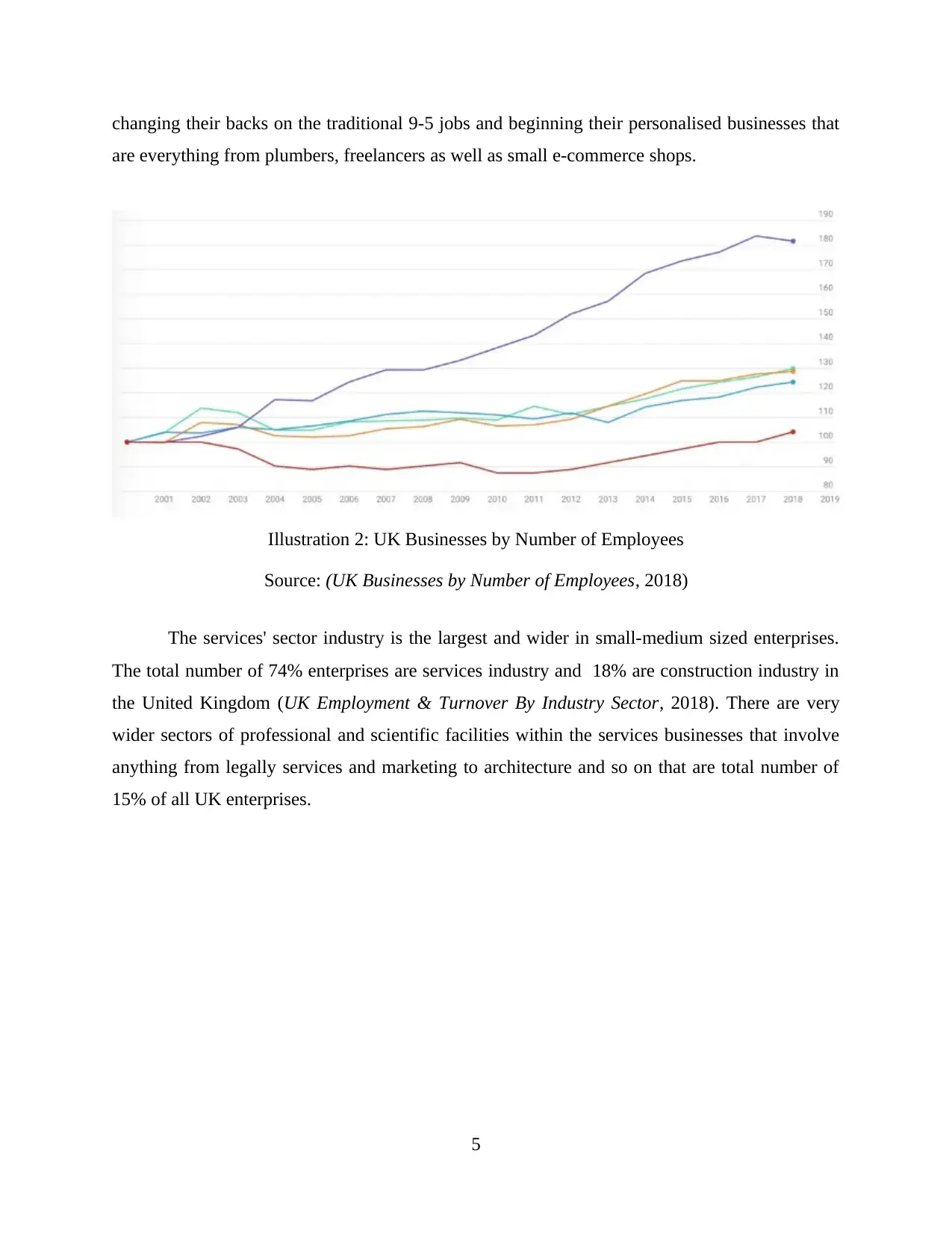
changing their backs on the traditional 9-5 jobs and beginning their personalised businesses that
are everything from plumbers, freelancers as well as small e-commerce shops.
The services' sector industry is the largest and wider in small-medium sized enterprises.
The total number of 74% enterprises are services industry and 18% are construction industry in
the United Kingdom (UK Employment & Turnover By Industry Sector, 2018). There are very
wider sectors of professional and scientific facilities within the services businesses that involve
anything from legally services and marketing to architecture and so on that are total number of
15% of all UK enterprises.
5
Illustration 2: UK Businesses by Number of Employees
Source: (UK Businesses by Number of Employees, 2018)
are everything from plumbers, freelancers as well as small e-commerce shops.
The services' sector industry is the largest and wider in small-medium sized enterprises.
The total number of 74% enterprises are services industry and 18% are construction industry in
the United Kingdom (UK Employment & Turnover By Industry Sector, 2018). There are very
wider sectors of professional and scientific facilities within the services businesses that involve
anything from legally services and marketing to architecture and so on that are total number of
15% of all UK enterprises.
5
Illustration 2: UK Businesses by Number of Employees
Source: (UK Businesses by Number of Employees, 2018)

Impact of Micro Business:
There are high volume of sole trader and micro enterprise in United Kingdom. Without
firms, any workers remain very close of which £8000 average. Firms with 1-9 workers creates
almost double as much profitability as those with no workers and jump in profits for small
enterprises with 10-49 workers is almost four time as large (Average profits of SMEs, 2018).
6
Illustration 3: UK Employment & Turnover By Industry Sector
Source: (UK Employment & Turnover By Industry Sector, 2018)
There are high volume of sole trader and micro enterprise in United Kingdom. Without
firms, any workers remain very close of which £8000 average. Firms with 1-9 workers creates
almost double as much profitability as those with no workers and jump in profits for small
enterprises with 10-49 workers is almost four time as large (Average profits of SMEs, 2018).
6
Illustration 3: UK Employment & Turnover By Industry Sector
Source: (UK Employment & Turnover By Industry Sector, 2018)
⊘ This is a preview!⊘
Do you want full access?
Subscribe today to unlock all pages.

Trusted by 1+ million students worldwide
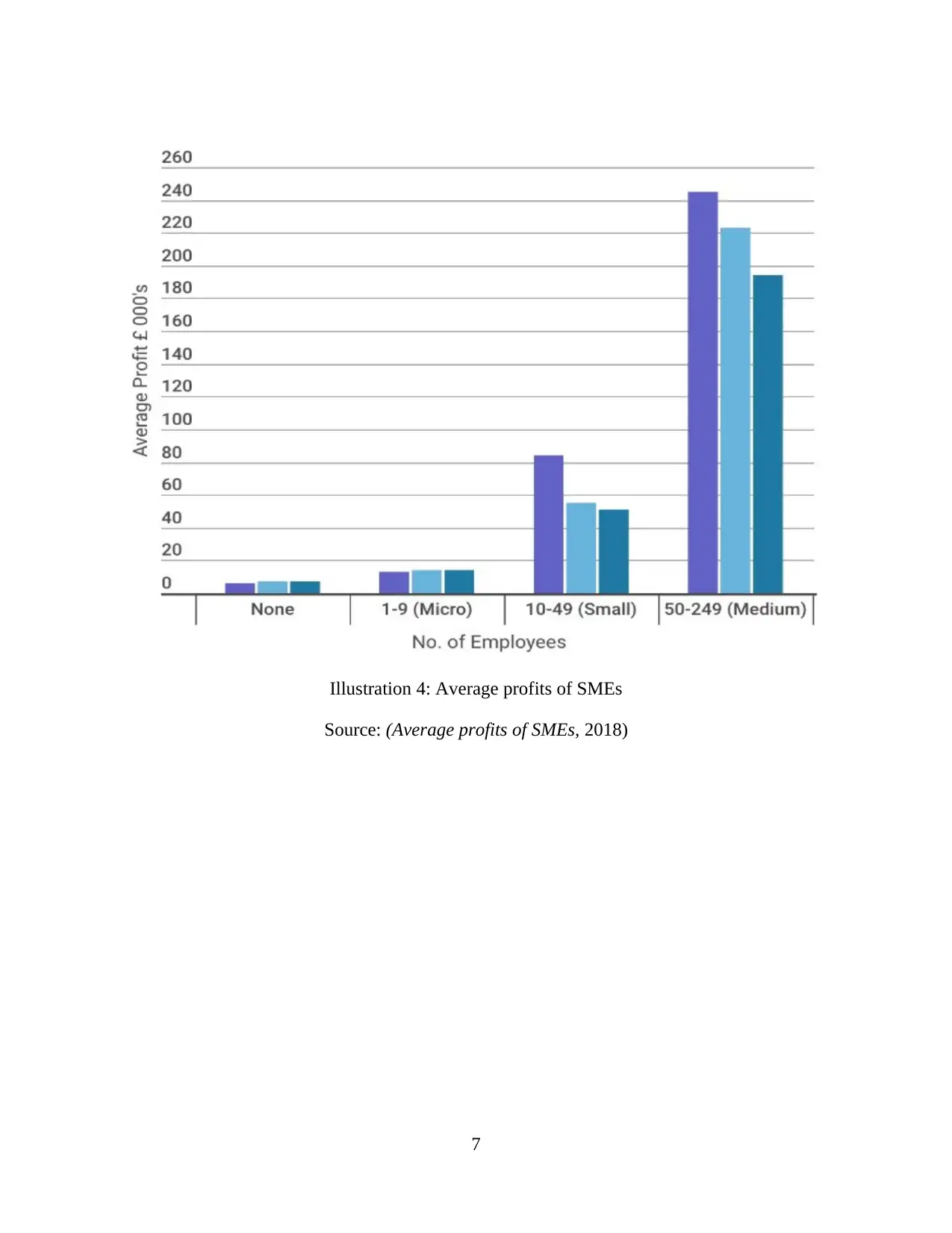
7
Illustration 4: Average profits of SMEs
Source: (Average profits of SMEs, 2018)
Illustration 4: Average profits of SMEs
Source: (Average profits of SMEs, 2018)
Paraphrase This Document
Need a fresh take? Get an instant paraphrase of this document with our AI Paraphraser
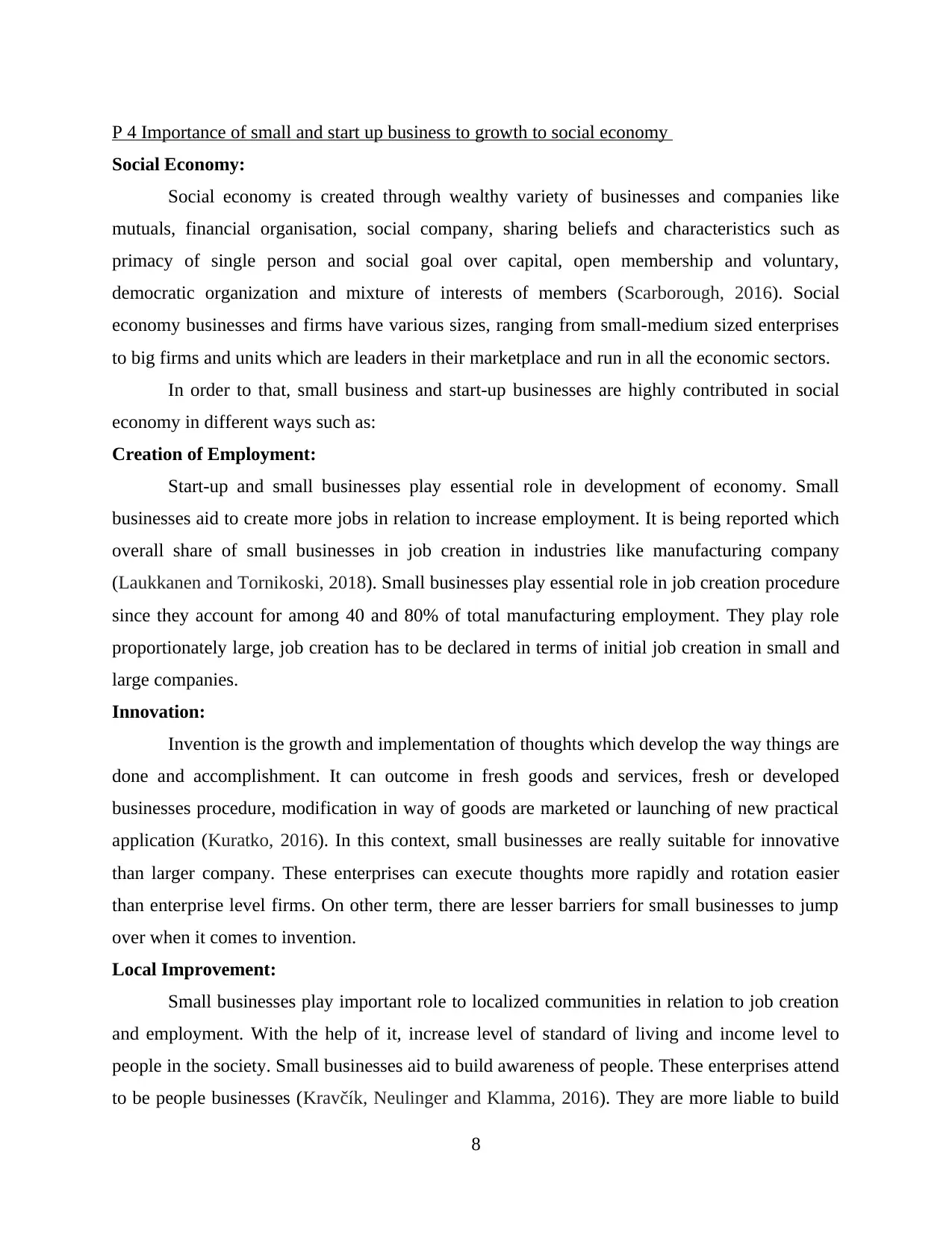
P 4 Importance of small and start up business to growth to social economy
Social Economy:
Social economy is created through wealthy variety of businesses and companies like
mutuals, financial organisation, social company, sharing beliefs and characteristics such as
primacy of single person and social goal over capital, open membership and voluntary,
democratic organization and mixture of interests of members (Scarborough, 2016). Social
economy businesses and firms have various sizes, ranging from small-medium sized enterprises
to big firms and units which are leaders in their marketplace and run in all the economic sectors.
In order to that, small business and start-up businesses are highly contributed in social
economy in different ways such as:
Creation of Employment:
Start-up and small businesses play essential role in development of economy. Small
businesses aid to create more jobs in relation to increase employment. It is being reported which
overall share of small businesses in job creation in industries like manufacturing company
(Laukkanen and Tornikoski, 2018). Small businesses play essential role in job creation procedure
since they account for among 40 and 80% of total manufacturing employment. They play role
proportionately large, job creation has to be declared in terms of initial job creation in small and
large companies.
Innovation:
Invention is the growth and implementation of thoughts which develop the way things are
done and accomplishment. It can outcome in fresh goods and services, fresh or developed
businesses procedure, modification in way of goods are marketed or launching of new practical
application (Kuratko, 2016). In this context, small businesses are really suitable for innovative
than larger company. These enterprises can execute thoughts more rapidly and rotation easier
than enterprise level firms. On other term, there are lesser barriers for small businesses to jump
over when it comes to invention.
Local Improvement:
Small businesses play important role to localized communities in relation to job creation
and employment. With the help of it, increase level of standard of living and income level to
people in the society. Small businesses aid to build awareness of people. These enterprises attend
to be people businesses (Kravčík, Neulinger and Klamma, 2016). They are more liable to build
8
Social Economy:
Social economy is created through wealthy variety of businesses and companies like
mutuals, financial organisation, social company, sharing beliefs and characteristics such as
primacy of single person and social goal over capital, open membership and voluntary,
democratic organization and mixture of interests of members (Scarborough, 2016). Social
economy businesses and firms have various sizes, ranging from small-medium sized enterprises
to big firms and units which are leaders in their marketplace and run in all the economic sectors.
In order to that, small business and start-up businesses are highly contributed in social
economy in different ways such as:
Creation of Employment:
Start-up and small businesses play essential role in development of economy. Small
businesses aid to create more jobs in relation to increase employment. It is being reported which
overall share of small businesses in job creation in industries like manufacturing company
(Laukkanen and Tornikoski, 2018). Small businesses play essential role in job creation procedure
since they account for among 40 and 80% of total manufacturing employment. They play role
proportionately large, job creation has to be declared in terms of initial job creation in small and
large companies.
Innovation:
Invention is the growth and implementation of thoughts which develop the way things are
done and accomplishment. It can outcome in fresh goods and services, fresh or developed
businesses procedure, modification in way of goods are marketed or launching of new practical
application (Kuratko, 2016). In this context, small businesses are really suitable for innovative
than larger company. These enterprises can execute thoughts more rapidly and rotation easier
than enterprise level firms. On other term, there are lesser barriers for small businesses to jump
over when it comes to invention.
Local Improvement:
Small businesses play important role to localized communities in relation to job creation
and employment. With the help of it, increase level of standard of living and income level to
people in the society. Small businesses aid to build awareness of people. These enterprises attend
to be people businesses (Kravčík, Neulinger and Klamma, 2016). They are more liable to build
8

personal relations with clients and knowing many of them through their name. In this context,
small businesses make efforts to improvement and progression of localised community in UK
economy.
LO 3
9
small businesses make efforts to improvement and progression of localised community in UK
economy.
LO 3
9
⊘ This is a preview!⊘
Do you want full access?
Subscribe today to unlock all pages.

Trusted by 1+ million students worldwide
1 out of 19
Related Documents
Your All-in-One AI-Powered Toolkit for Academic Success.
+13062052269
info@desklib.com
Available 24*7 on WhatsApp / Email
![[object Object]](/_next/static/media/star-bottom.7253800d.svg)
Unlock your academic potential
Copyright © 2020–2026 A2Z Services. All Rights Reserved. Developed and managed by ZUCOL.




